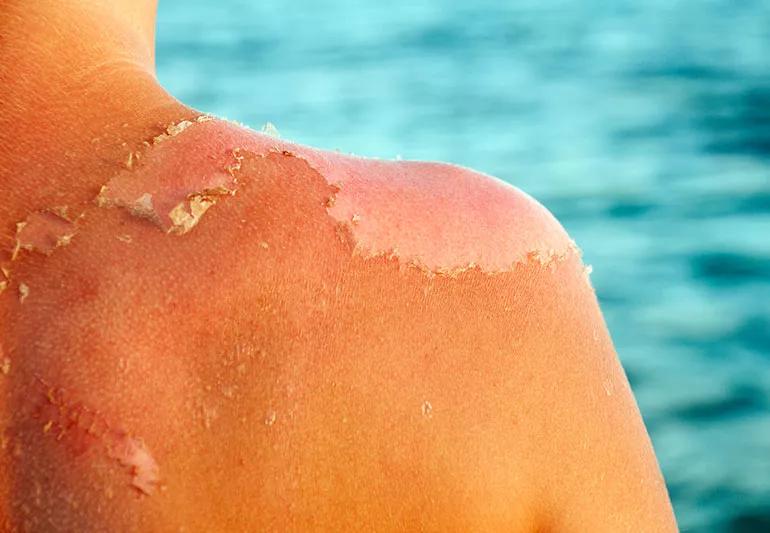A dermatologist explains this agonizing type of sunburn

Image content: This image is available to view online.
View image online (https://assets.clevelandclinic.org/transform/c21603a6-5431-48ff-80be-efe63ab4c2d6/HellsItch-175383361-770x533-1_jpg)
Close-up shot of sunburnt skin, peeling on the shoulder to expose raw skin.
Sunburns are common and so is the mild itching and pain that can accompany them. But for certain people, a healing sunburn can turn into a temporarily unrelenting nightmare that’s appropriately nicknamed “hell’s itch.” Though it may seem like a comical name, the symptoms it causes are anything but funny.
Advertisement
Cleveland Clinic is a non-profit academic medical center. Advertising on our site helps support our mission. We do not endorse non-Cleveland Clinic products or services. Policy
So, what the heck is it? “Hell’s itch is this deep, painful, almost throbbing, itch that happens one to three days after a sunburn, often on the upper back and shoulders,” says dermatologist Melissa Piliang, MD.
People have described their experiences as feeling “like fire ants are biting you under your skin,” “wanting to rip your skin off” or “an uncontrollable itch that, when scratched, causes stabbing pain.” The symptoms seem to come in waves and typically relent within 48 hours.
Hell’s itch appears to only affect a small percentage of people. “Anyone who has a sunburn could get it, but it seems to be more common in fair-skinned people and people who have been at higher altitudes where the sun is more intense, like in the mountains,” Dr. Piliang says.
It’s unclear exactly why hell’s itch happens, but it may be due to damage in the nerve endings at the site of your burn, triggering an overreaction. It seems to happen more often with severe sunburns.
Most cases of hell’s itch can be treated at home, but “if you have blisters over a large area of your body, fever, chills, dizziness or confusion, you should see a doctor,” Dr. Piliang advises.
She suggests these at-home remedies to relieve your symptoms:
Advertisement
If you develop hell’s itch once, you can get it again simply because it’s a risk for anyone with a sunburn. The only way to prevent it is to avoid getting a sunburn. Here are Dr. Piliang’s sunscreen tips:
Advertisement

Sign up for our Health Essentials emails for expert guidance on nutrition, fitness, sleep, skin care and more.
Learn more about our editorial process.
Advertisement
Several conditions, like vitiligo and fungal infection, can cause a loss of pigmentation, leading to white spots or patches on your skin
This cooling gel can help soothe sunburned skin, but it can’t cure the burn
You know it’s not good if you’ve been holding onto it for more than three years or if it’s changed in color, consistency or smell
Look for a UPF rating of 50+ for optimal protection against UV rays
A sunburn will leave you itchy and red, while sun poisoning can feel like an allergic reaction
A cool shower, aloe vera gel, anti-itch treatments and cool compresses can provide fast sunburn relief
SPF stands for ‘sun protection factor’ — it’s a measure of how much protection you’re getting before a sunburn is possible
This ‘poisoning’ is actually a severe sunburn that seems similar to an allergic reaction
Although it could be used as a moisturizer, this new trend is not recommended
Communicating clear limits helps protect your time, energy and emotional well-being
High cholesterol can be genetic, but testing and treatment can lower your heart disease risk